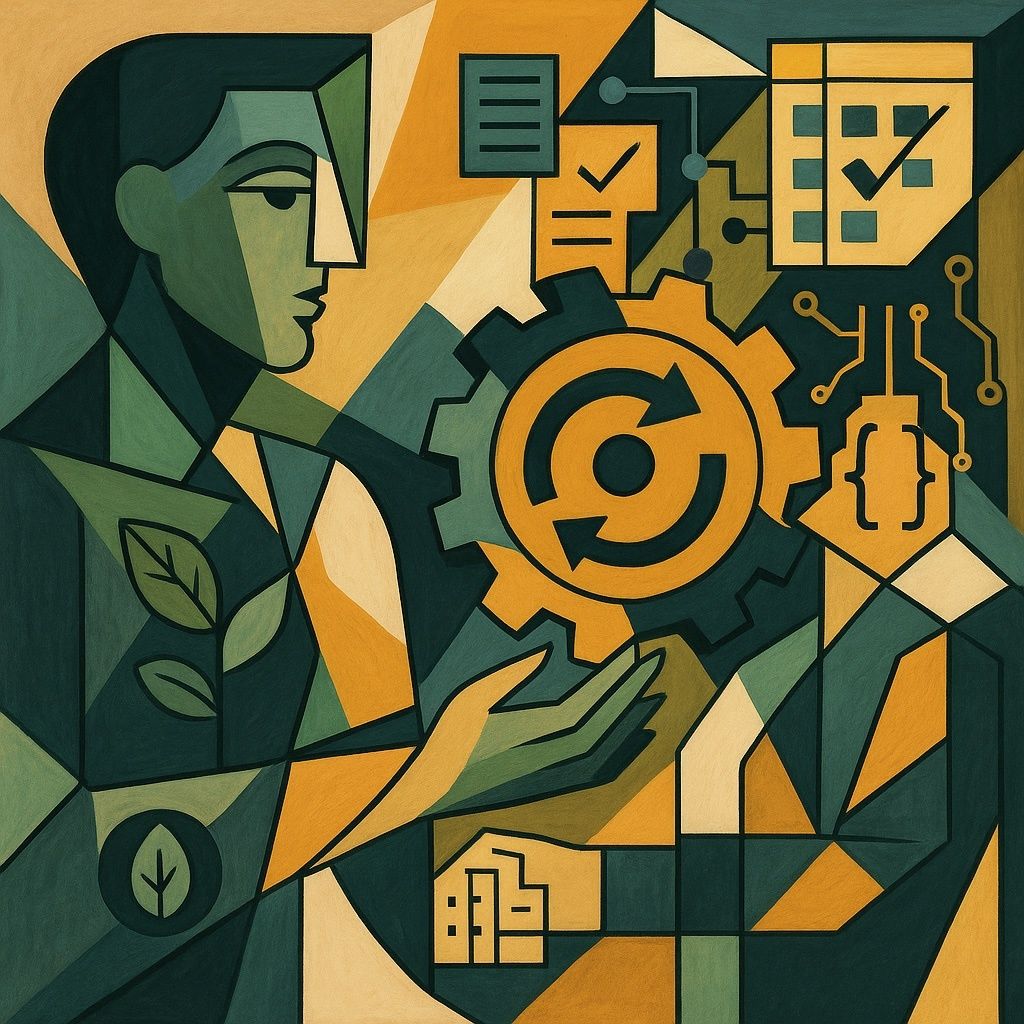At first, AI just took my meeting minutes. Then it flagged actions, set up my calendar, even wrote code from the same meeting minutes. Each step was progress or so it seemed - a little less of me needed each time. Alone, that looks like convenience. Scaled across millions, it looks like a ratchet.
It doesn’t happen in a single leap. It happens in phases.
Assist → AI drafts emails, suggests edits, researches faster than you could. A lawyer reviewing case files can finish in hours instead of days.
Embed → AI answers queries, schedules meetings, even writes and deploys code. A programmer debugging sees errors resolved before they even compile.
Redesign → Humans shift to orchestrators, stepping in only for judgment or escalation. A marketing team curates AI-generated drafts into campaigns, focusing on strategy and client nuance instead of copywriting from scratch.

Companies are seizing on these leaps. Duolingo leaned on AI to produce lessons at scale, cutting development time. Klarna’s AI assistant now does the work of 700 agents. Amazon’s robots already handle three-quarters of its packages. IBM has paused hiring across thousands of back-office roles. Productivity rises, costs fall and shareholders applaud.
If this were only a story of efficiency, we’d be celebrating without hesitation but not always.
The ratchet doesn’t turn evenly.
Some companies sprinted ahead, then pulled back. Duolingo discovered cultural nuance, idioms and pedagogical design couldn’t be automated without losing quality. Microsoft’s study of 200,000 AI interactions revealed that nearly half the time, the AI’s output didn’t align with what the human actually wanted and the authors caution that applicability doesn't equal displacement (for now).
More importantly: not everyone feels the pressure the same way.
For assistants, diary management and email drafting - once daily bread-and-butter - are being quietly absorbed by AI. For junior analysts, the grunt work of combing through hundreds of pages to produce summaries is done in seconds, leaving fewer opportunities to learn on the job and in turn having broader implications for talent pipelines and future leadership. For clerical workers, especially in mid-wage roles often held by women, exposure to AI automation is just as high as for well-paid professionals.
Across the globe, the imbalance is starker still. In Bangalore or Manila, back-office workers who powered decades of outsourced growth are watching entire workflows - from invoice processing to customer service - disappear overnight. What looked like a ladder of opportunity is suddenly being pulled away.
The ratchet doesn’t just create efficiency. Left unchecked, it compounds inequity.
The real crux isn’t efficiency alone. It’s efficiency vs. equity.
The ratchet will keep turning. But how tightly it winds - and who gets squeezed - depends on the choices we make.
Reskill with purpose. A customer service rep doesn’t just “learn AI” - they move into customer journey design. A translator shifts into localisation strategy. Transitions work best when there’s a destination and not just vague promises of “new skills.”
Make benefits portable. If pensions, healthcare and leave travel with workers, job shifts feel less like cliffs and more like steps. Career portability is stability.
Share the gains. Iceland’s 35-hour week proved productivity can stay high even as hours fall. The 8-hour day itself was once a radical response to industrialisation. Paid weekends, overtime limits and even early welfare programs all emerged as society’s way of redistributing the dividends of technology. Today, experiments with 4-day weeks and Univarsal Basic Income pilots echo the same principle: when technology boosts output, society can choose to turn that into more freedom.
Stay transparent. People deserve to know where AI sits in their workflow and how it changes role expectations. Shadows erode trust - clarity builds it.
AI may arrive as a colleague who’s “just here to help”… until it quietly becomes the only one doing the easier half of your job. And if the ratio changes enough times, your role - and maybe your industry - starts to look different.
When you look back in five years, will the ratchet have shifted your job… or your choices?
The machine isn’t deciding how work changes - we are. Are we ready to take that responsibility?
History won’t remember whether AI made us faster. It will remember whether we had the courage to shape its impact.



:max_bytes(150000):strip_icc()/GettyImages-2078438492-5e3f5ca31f24424ba476ffa56da9250e.jpg)


